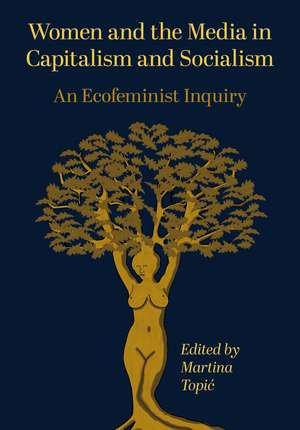Women and the Media in Capitalism and Socialism: An Ecofeminist Inquiry
Editat de Martina Topicen Limba Engleză Hardback – 23 iun 2023
Women and the Media in Capitalism and Socialism examines the news media in capitalist, socialist, and mixed governments to understand the position of women—both their work as journalists and their perception by readers and viewers. Drawing on case studies from around the world, the contributors ask: Who creates the news about women? Who is empowered to act as a news source? And what is the impact? The contributors then apply these questions to an array of examples, including sports journalists in the United Kingdom, reports about violence against women in Spain, news creation in Nigeria, and media representation of female politicians in Croatia.
Grounded in ecofeminism, the volume argues that women hold unequal positions in both capitalist and socialist societies and that these imbalances can only be erased through structural changes. This exciting international collaboration contributes to research on women in the media and grows our understanding of how gender inequities are experienced in different political economies.
Preț: 693.74 lei
Preț vechi: 900.95 lei
-23% Nou
Puncte Express: 1041
Preț estimativ în valută:
132.76€ • 138.10$ • 109.60£
132.76€ • 138.10$ • 109.60£
Carte disponibilă
Livrare economică 24 martie-07 aprilie
Livrare express 08-14 martie pentru 36.11 lei
Preluare comenzi: 021 569.72.76
Specificații
ISBN-13: 9781789386684
ISBN-10: 1789386683
Pagini: 328
Ilustrații: 3 tables, 6 graphs
Dimensiuni: 170 x 244 x 23 mm
Greutate: 0.65 kg
Editura: Intellect Ltd
Colecția Intellect Ltd
ISBN-10: 1789386683
Pagini: 328
Ilustrații: 3 tables, 6 graphs
Dimensiuni: 170 x 244 x 23 mm
Greutate: 0.65 kg
Editura: Intellect Ltd
Colecția Intellect Ltd
Notă biografică
Martina Topić is a reader at Leeds Business School at Leeds Beckett University. She formerly worked as a print journalist in Croatia, Slovenia, and Italy.
Cuprins
Introduction: An Ecofeminist Perspective on Women and the Media in Capitalism and Socialism
Martina Topic
SECTION I: WOMEN AND THE MEDIA IN CAPITALISM
Whither Gender Equality? The Image of Women in News over Time
Hanne Vandenberghe
Losing on Aggregate: The Visibility of Female Sports Journalists in the UK and the Dominant Perceptions of Female Football Journalists
Bethany Fenner and Barbara Henderson
New New New (n3) Portrayals of Women in Television and Postfeminist News
Batya Weinbaum
When Sexism in Politics became a Media Issue in France: Mobilization of Female Political Journalists
Béatrice Damian-Gaillard and Eugénie Saitta
Who Creates the News about Violence Against Women? The Case of Spain
Belén Zurbano-Berenguer Salomé Sola-Morales and Paloma Sanz-Marcos
Women in Portuguese Print Media
Maria João Cunha and Carla Isabel Cruz
One Human, Unequal Gender: A Critical Appraisal of Women and News Creation in Nigeria
Chinedu J. Nwasum, Jude Ogbodo, Joseph N. Chukwu and Sanita E. Nwakpu
SECTION II: WOMEN AND THE MEDIA IN SOCIALISM AND POST-SOCIALISM
The Media Representation of Female Politicians in Croatia: Who will give us power if we think we do not deserve it?
Mirela Holy
Being a Female Journalist in Serbia: Socialist and Post-Socialist Perspective
Nataša Simeunovic Bajic, Marija Vujovic and Anka Mihajlov Prokopovic
Cuban Women and the Media: A View of Cinema
Elena Díaz and Lisa Makarchuk
Narratives about Women's Identity in Yugoslavia from a Croatian Perspective
Nikolina Borcic and Ivona Culo
Visual Representation of Fashion and Clothing Practices in the post-war Period of Socialist Yugoslavia in the Magazines Žena u borbi (Women in Struggle) and Naša moda (Our Fashion)
Ivana Culjak and Lea Vene
The Female Profile Promoted in Scânteia during the First Decade of the Communist Regime in Romania
Ovidiana Bulumac
Martina Topic
SECTION I: WOMEN AND THE MEDIA IN CAPITALISM
Whither Gender Equality? The Image of Women in News over Time
Hanne Vandenberghe
Losing on Aggregate: The Visibility of Female Sports Journalists in the UK and the Dominant Perceptions of Female Football Journalists
Bethany Fenner and Barbara Henderson
New New New (n3) Portrayals of Women in Television and Postfeminist News
Batya Weinbaum
When Sexism in Politics became a Media Issue in France: Mobilization of Female Political Journalists
Béatrice Damian-Gaillard and Eugénie Saitta
Who Creates the News about Violence Against Women? The Case of Spain
Belén Zurbano-Berenguer Salomé Sola-Morales and Paloma Sanz-Marcos
Women in Portuguese Print Media
Maria João Cunha and Carla Isabel Cruz
One Human, Unequal Gender: A Critical Appraisal of Women and News Creation in Nigeria
Chinedu J. Nwasum, Jude Ogbodo, Joseph N. Chukwu and Sanita E. Nwakpu
SECTION II: WOMEN AND THE MEDIA IN SOCIALISM AND POST-SOCIALISM
The Media Representation of Female Politicians in Croatia: Who will give us power if we think we do not deserve it?
Mirela Holy
Being a Female Journalist in Serbia: Socialist and Post-Socialist Perspective
Nataša Simeunovic Bajic, Marija Vujovic and Anka Mihajlov Prokopovic
Cuban Women and the Media: A View of Cinema
Elena Díaz and Lisa Makarchuk
Narratives about Women's Identity in Yugoslavia from a Croatian Perspective
Nikolina Borcic and Ivona Culo
Visual Representation of Fashion and Clothing Practices in the post-war Period of Socialist Yugoslavia in the Magazines Žena u borbi (Women in Struggle) and Naša moda (Our Fashion)
Ivana Culjak and Lea Vene
The Female Profile Promoted in Scânteia during the First Decade of the Communist Regime in Romania
Ovidiana Bulumac
Recenzii
"The book offers a multidimensional analysis that spans various countries, media landscapes, and sociopolitical contexts, illustrating the pervasive nature of gender inequality and the challenges of dismantling patriarchal structures. [...] This work not only contributes significantly to the fields of gender studies and media studies but also serves as a call to action for addressing the intertwined oppressions of women, media, and nature in the quest for a more just world."
